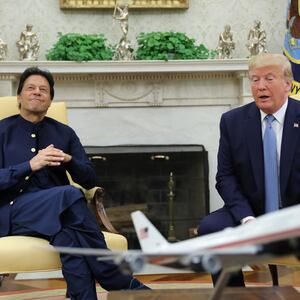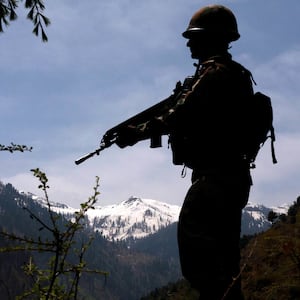KARACHI, Pakistan—Two separate attacks last month on the Pakistan armed forces that killed 10 personnel in North Waziristan and Balochistan, areas bordering Afghanistan, were actually attacks on the Afghan peace process. They came hardly a week after Prime Minister Imran Khan, in a meeting at the White House, assured U.S. President Donald Trump of his country's all-out efforts to advance Afghan peace.
The timing is significant and suggests just how complex the Afghan situation is as Trump’s negotiators try to lay the groundwork for American withdrawal from the longest war in U.S. history. Washington has long believed that the solution to the Afghan problem, if there is one, lies with Pakistan, but the government here in Pakistan is sometimes cast as a hero, working toward a resolution, and sometimes as a villain supporting the Taliban.
In any case, there is no question that Islamabad holds a strong hand in the Afghan war game, especially as Trump looks for ways to walk away from the table—and he appears to have made a significant tilt toward Pakistan following his July 22 meeting with Prime Minister Khan.
In the process, however, Washington is pushing India to the sidelines, and already we see regional repercussions, not least in always volatile Kashmir, where recent moves by Indian Prime Minister Narendra Modi have led to an enormous increase in tensions between nuclear armed India and Pakistan.
In fact, this region defies simple stereotyping. Washington’s other strategic interests have brought it closer to India, Pakistan's arch rival, and in Afghanistan the U.S. actually has been fighting on two fronts, or more: an open war with Islamic extremists, and a more subtle rivalry with China.
Concerned with Beijing’s rising power and influence, Washington sees New Delhi as a counterweight, while India smartly exploits the U.S. “China obsession” to safeguard its own strategic interests.
The U.S. has for many years encouraged and facilitated India’s efforts to increase its stake in Afghanistan, and this has not been without sinister implications. While New Delhi frequently denounces what it claims is Pakistani support for terrorist movements, mostly linked to the conflict over divided Kashmir, Islamabad’s intelligence services maintain that India supports terrorists attacking Pakistan, and cite the attacks last month as typical examples.
From the Pakistani perspective, Tehrik-e-Taliban Pakistan (TTP) or Pakistani Taliban and Baloch separatists are India's strategic assets in Afghanistan now, with serious implications for this country’s security. These allegedly India-sponsored terrorists attack the security forces, national infrastructure, foreigners and various people on ethnic lines to fuel unrest in the country.
Although this aspect of the Afghan conflict—or Af-Pak conflict, as they say in Washington—gets scant international attention, it is not exactly a secret.
In one well-known incident, former Sen. Chuck Hagel, while serving as chair of the President's Intelligence Oversight Board, told an audience at Oklahoma's Cameron University in 2011 that he essentially agreed with Pakistan’s accusations against India. “India for some time has always used Afghanistan as a second front, and India has over the years financed problems for Pakistan on that side of the border,” Hagel said. The remarks subsequently raised a storm of controversy during Hagel’s 2013 confirmation hearings as secretary of defense.
"We appreciate very much the significant role that India is playing in Afghanistan," Assistant Secretary of State for South and Central Asia Robert Blake told a Congressional hearing at the time. "In fact, we see India as kind of the economic linchpin for the future."
Over the past 18 years, India increased significantly its presence in and around Afghanistan to open the possibility of a second front on Pakistan’s frontier. In Tajikistan, which shares a 1357-km (843-mile) border with Afghanistan, India has established its first military base ever outside its territory. The installation at Farkhor is operated by the Indian Air Force in collaboration with Tajik Air Force, and since 2002 it has been used to transport military supplies to the Afghan Northern Alliance.
Pakistan's northwestern Khyber Pakhtunkhwa province, including the tribal area, and its southwestern Balochistan province, which share long borders with Afghanistan, have been particular targets of terrorists allegedly funded by India.
As a result of military operation carried out by Pakistan armed forces in the tribal area along Afghanistan border, the TTP network was dismantled and hundreds of terrorists were killed while others refuge in Afghanistan.
The TTP has been a killing machine. It is responsible for hundreds of suicide attacks on Pakistani civilians and armed forces across the country. Mullah Fazlullah, the leader of the Pakistani Taliban, fled to Afghanistan in 2009 and is still orchestrating attacks on Pakistan from there.
Who has provided him a safe haven on Afghan soil? Who is using Fazlullah against Pakistan? Islamabad’s suspicions are heightened by remarks such as those made in 2013, by Ajit Doval, who would become national security adviser to Narendra Modi in Modi’s first term.
Doval, speaking at Sastra University in Tamil Nadu, reportedly addressed the question, "How do we tackle Pakistan?” His response: “You make it difficult for them to manage their internal security.” Doval suggested that “Pakistan's vulnerability is many many times higher than India's.” He noted that the Pakistani Taliban had beheaded 23 Pakistani soldiers, and their services could essentially be bought. “The [Pakistani] Taliban are mercenaries,” said Doval. “Go for more of a covert thing."
There are other several speeches of Doval which clearly indicate India’s involvement in a proxy war against Pakistan.
In March 2016, an alleged Indian spy and serving officer with the Indian navy named Kulbhushan Jadhav was reported captured with fake identity documents in Balochistan. The officer, who allegedly worked for India’s Research and Analysis Wing (RAW), was tried in a military court that sentenced him to death for espionage and subversive activities.
Indian authorities claimed he had retired from the navy to run a small business in the Iranian port of Chabahar, near the Pakistani border, and was kidnapped from there.
A videotaped confession was released in 2016 by Inter Services Public Relations (ISPR), Pakistan's military media wing. As with most such confessions, it presumably was made under duress, combining bits of confession with information or disinformation the interrogators wanted to make public, but the details are interesting nonetheless.
Jadhav said that he fomented terrorism, particularly in Balochistan:
"My name is Commander Kulbhushan Jadav and I am the serving officer of Indian Navy. I am from the cadre of engineering department of Indian Navy and my cover name was Hussein Mubarik Patel, which I had taken for doing some intelligence gathering for Indian agencies...”
He said he was signed up by RAW in 2013 and “ever since I have been directing various activities in Balochistan and Karachi at the behest of RAW” to undermine law and order in Karachi. “I was basically the man for Mr. Ani Kumar Gupta who is the joint secretary of RAW, and his contacts in Pakistan, especially in Balochistan Student Organization.” Jadav said his assignment was “to hold meetings with Baloch insurgents and carry out activities with their collaboration.”
Jadav said finances were fed into the Baloch movement through various channels to fund terrorist activities, particularly in Gwadar and other ports along the Balochistan coast.
The International Criminal Court called on Pakistan not to carry out the death penalty and to further review the case in light of the Vienna Convention, but its ruling announced on July 17 this year did not overturn the verdict.
One might ask how Pakistan let India become a major stakeholder in Afghanistan under pressure from the United States.
The problems in Balochistan, an internal affair of Pakistan, should have been resolved politically by the authorities. It is actually the military handling of a political issue that created the mess. Baloch nationalists have long resented the control of central authorities in Islamabad over the province's natural resources, lack of provincial autonomy, unitary type of governance and the arbitrary nature of the decision-making process in Islamabad. This fueled the feeling of deprivation, alienation and frustration among young Baloch.
Instead of addressing the genuine grievances of the province, the authorities undertook five military operations at different times over the last seven decades. There is a need to marginalize separatists from nationalists who have been struggling for political and economic rights as enshrined in the country's constitution. The military operations deepened the sense of alienation in the province.
India was able to take advantage of the simmering situation in Balochistan, and, from the Pakistani perspective, is a real trouble-maker. It continuously tries to create a war-like situation on Pakistan’s eastern Kashmir border with an aim to engage the country’s military, diverting its attention at a critical time when it is engaged full time on its western border with Afghanistan.
This is exactly what India has done changing the legal status of Kashmir after it was shut out of the Afghan Peace process.
Pakistan is likely to set two pre-conditions for the U.S. if Washington truly wants it to play its key role to advance Afghan peace process.
Firstly, Islamabad may seek assurances from the U.S. that Afghanistan soil will not be used to harbor anti-Pakistan actors. Secondly, India will deescalate tensions on the eastern Kashmir border.
Realistically speaking, India is unable to play any role in Afghanistan in the absence of U.S. forces. It shares no border with Afghanistan, exercises no political influence there and has no cultural or religious affinity with the Afghan people. Over the past 15 years, to the extent New Delhi achieved its objectives it did so with the help of the U.S., but what good has that done for the United States?
Withdrawal of U.S. troops would end the security cover the India enjoys to increase its presence in the war-torn country.







